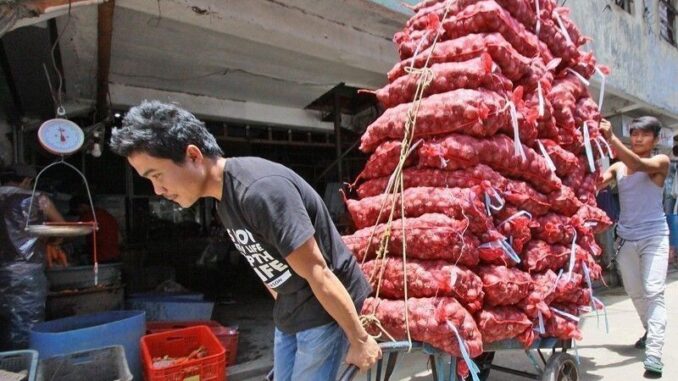
MANILA, Philippines — The Philippine Competition Commission (PCC) has filed charges against 12 vegetable traders for engaging in anti-competitive agreements in the supply of imported onions.
If found guilty, the traders could be fined a total of P2.4 billion.
In a press conference yesterday, PCC Enforcement Office director Christian Loren delos Santos said his office filed an administrative case before the commission against onion importers and traders for violating Section 14 of the Philippine Competition Act, which prohibits agreements between competitors that restrict or reduce market competition.
Named in the Statement of Objection are Philippine Vieva Group of Companies (Phil. Vieva Group), Tian Long Corp., La Reina Fresh Vegetables & Young Indoor Plants, Yom Trading Corp., Vegetable Importers, Exporters & Vendors Association of the Philippines (VIEVA Phils.) and Golden Shine International Freight Forwarders.
Also named as individual respondents are Lilia Cruz as vice president of Phil. Vieva Group, chairperson and president of Golden Shine and chairperson of VIEVA Phils.; Eric Pabilona as board member of Phil. Vieva Group, corporate executive officer of Golden Shine and corporate secretary of Tian Long; Renato Francisco Jr. as board member of Phil. Vieva Group, president of La Reina and chairman and president of Yom Trading; Letty Baculando, board member of Phil. Vieva Group and incorporator of Golden Shine; Mark Castro Ocampo, sole proprietor of Vegefru Producing Store; and Nancy Callanta Rosal, sole proprietor of Rosal Fruit and Vegetable Trading.
Delos Santos said the traders engaged in cartel-like behavior as they divided among themselves the volume of onion allowed to be imported by assigning among themselves the sanitary and phytosanitary import clearances (SPSIC) issued by the Bureau of Plant Industry.
He said the traders also exchanged sensitive business information like the price, suppliers, customers, volume, shipping, distribution and storage.
“So, by agreeing to allocate SPSICs and divide among themselves the actual volume of imports, respondents effectively controlled more than 50 percent of the volume of onions imported into the Philippines during the relevant period,” Delos Santos said, referring to the years 2019 to 2023 when the price of onions hit as high as P700 per kilogram.
“This case marks a milestone for competition law enforcement in the Philippines as this is the first time a ‘dawn raid’ was conducted,” Delos Santos said, referring to the administrative search and inspection where the PCC collected voluminous documents, records and electronic data related to the companies’ trading activities.
Delos Santos said the case is also significant as it involves the largest recommended fine by the PCC amounting to approximately P2.4 billion.
Under the Philippine Competition Act, entities found to have engaged in anti-competitive agreements may be fined at least P110 million. If a violation involves a basic necessity or prime commodity like onion, the fine may be tripled.
Upon receipt of the statement of objection, PCC will hear the case in the exercise of its power as a quasi-judicial agency.
“With the filing of this case, the Enforcement Office reiterates its commitment to upholding fair market competition and to ensure that consumers are protected from the harms of anti-competitive practices. We believe that if there is competition, consumers are the winners,” Delos Santos said.
Agriculture Secretary Francisco Tiu Laurel welcomed the filing of charges.
“I’m happy with the decision of PCC. It should be a sign to all smugglers and unscrupulous traders that we will go after all of them,” he said in a statement. “We can’t allow a few individuals, driven by an insatiable lust for money, to exploit our farmers and consumers or, worse, sabotage our economy.”
Laurel said that they are looking at possible blacklisting, as well as the withdrawal of accreditation of facilities used by the traders.
Department of Agriculture (DA) spokesperson Arnel de Mesa said the traders would not be allowed to take part in any onion importation even if their permits are still valid until next year.
He added that going after cartel operations and smugglers will help stabilize the supply and price of onions in the country.
Meanwhile, the Sandiganbayan has affirmed the validity of the graft and falsification charges the Office of the Ombudsman filed against dismissed DA assistant secretary Kristine Evangelista, other DA officials and Food Terminal Inc. officers in connection with the alleged profiteering and price manipulation of onions in 2022.
In a 16-page resolution promulgated on Aug. 30, the court’s Special Fifth Division denied Evangelista’s bid to dismiss the cases through a motion to quash.
The court found no merit in Evangelista’s argument that the ombudsman’s prosecution team failed to allege in the charge sheets her specific acts that constitute the commission of the alleged crimes nor her supposed conspiracy with the other accused officials. – Romina Cabrera, Elizabeth Marcelo


Be the first to comment